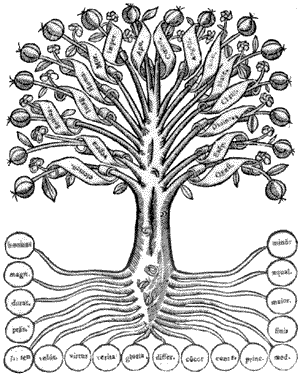abkünftig, abgeleitet, Derivat, second, derivative
N.p.c. avec Geschehen. (Martineau)
§ 13. Exemplo do ser-em num modo derivado. O conhecimento do mundo
VIDE: HyperHeidegger; Herkunft
VIDE: abkünftig
second (ETEM)
character (BTJS)
dérivé (ETJA)
NT: Derivative (abkünftig, abgeleitet, Derivat; Herkunft): character of statement, 133, 153-160 (§ 33); sense of “certainty,” 256; conception of guilt, 287; conception of time, 326, 329-331; conception of truth, 214, 219-226 (§ 44b), 256; kinds of understanding, 143, 147, 152, 160; underived character of Being, 4, 8; underived character of care, 182, 318; history as derivation, (Herkunft) from the past, 378; et passim. See also Deficient; Privative (BTJS)
§ 33 L’énoncé en tant que mode dérivé (abkünftig) de l’explicitation (EtreTemps33)
The pure, unconstrained making-present—the “I combine”—is the autonomous but derivative (abkünftige) mode of an original making-present on the part of factical existence itself. As pure and free making-present, it is accordingly a mode of time—or more precisely, a mode of human existence’s temporality—wherein time empties itself into the pure, free making-present of whatever-there-is. But insofar as presenting is still a mode of time, it is time in the full sense. The genesis of pure and unconstrained making-present from out of everyday being unto the world is what we have characterized as absorption in the world. It is nothing but the structure of the modification of the being of human existence in which human existence forms within itself the ontological mode of free, theoretical observation which, for its part, can be formalized into a mere “intending-something” in an “I-relate-to.” The ontological transition from the pre-theoretical relation to the world, to a pure (theoretical) making-present, is itself a mode of temporality—and it would be absolutely impossible if human existence were not itself time. (GA21; Sheehan)
